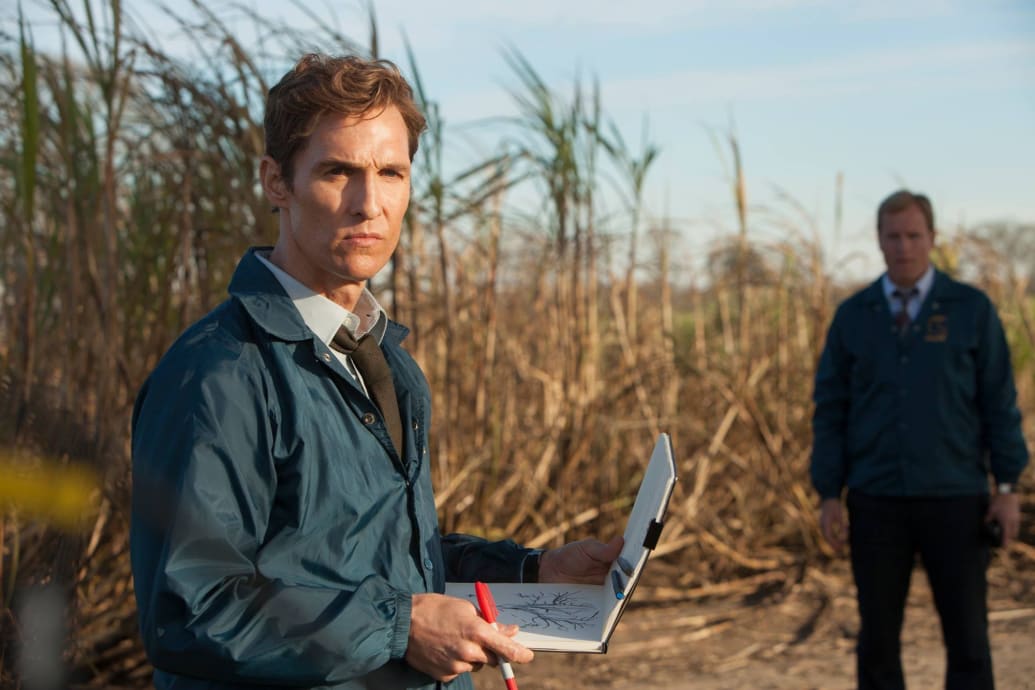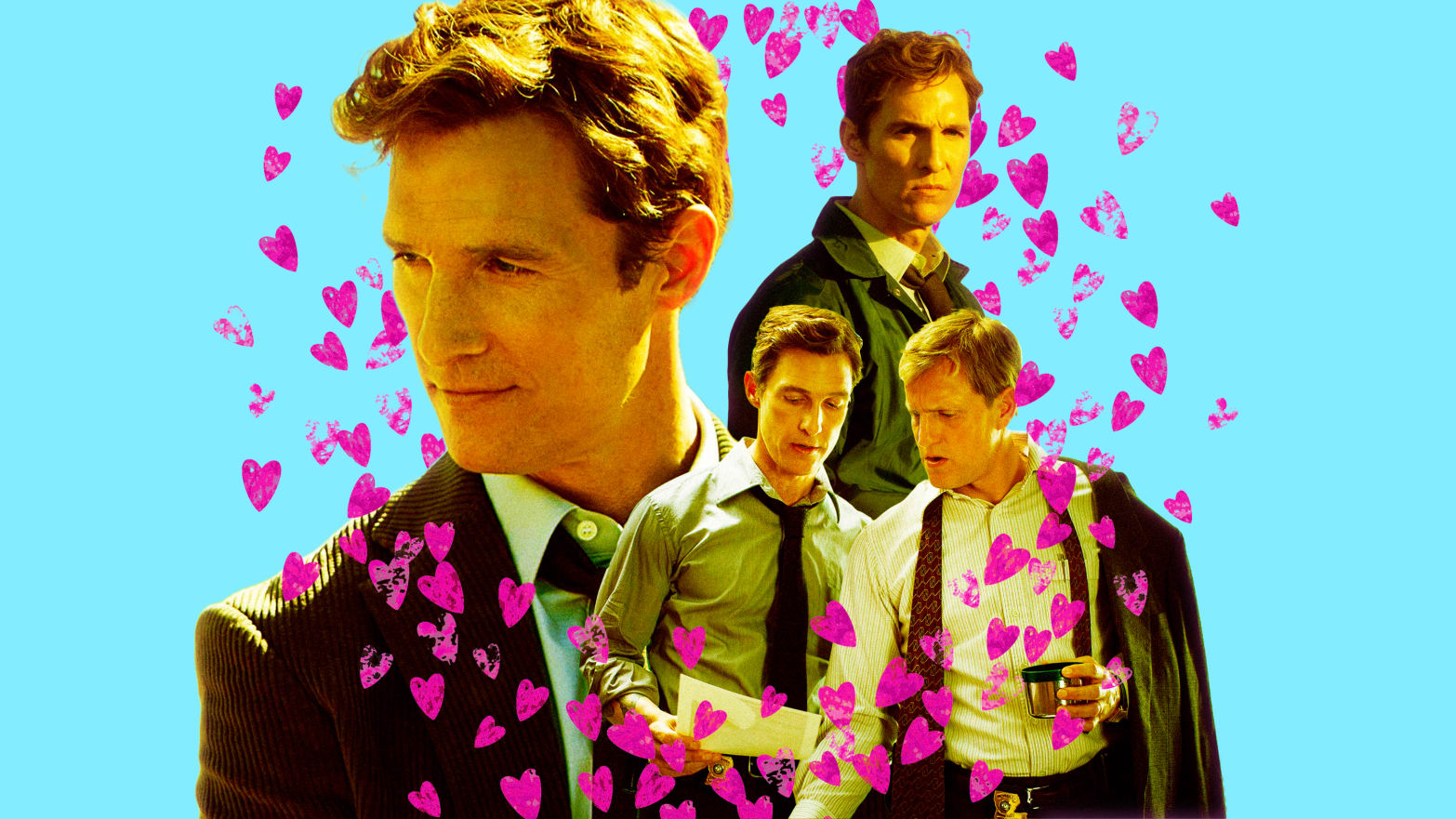If True Detective: Night Country has done one productive thing, it’s getting people’s eyes back on Season 1 of True Detective. The metaphysical detective series from creator and writer Nic Pizzolatto premiered in 2014 and starred Matthew McConaughey and Woody Harrelson as yin-and-yang partners Rust Cohle and Marty Hart, as the ideologically dueling pair struggle to solve a grisly crime from the mid-’90s that went on to haunt them for three decades. The show has since spawned three more seasons; its current, fourth iteration is Night Country, the first without Pizzolatto’s involvement beyond an executive producer credit. Night Country has drawn mixed reactions from viewers thus far, but that’s not entirely dissimilar from the way the series, to the outspoken ire of its passionate fans, has been unable to reach the epic highs of Season 1 ever since its conclusion (YMMV on Season 3, but I think it’s great).
I won’t get into my thoughts on Night Country (they aren’t favorable), but the five-year gap since the close of Season 3 and the, erm, shall we say, garish direct connections and references to Season 1 have brought TD Heads all the way back to where the series began: to the Yellow King, Carcosa, and the Tuttle family, the latter of whom are now inexplicably funding an arctic research station in Alaska—again, I won’t get into it.
But it’s also brought back a rush of feelings for many fans of the show, and women in particular, myself included—feelings of unquenchable, animalistic lust for McConaughey’s portrayal of the brooding, nihilistic Rustin Cohle. Searching “Rust Cohle” on Twitter (or X, whatever) brings up results akin to a search through the Tumblr tag of the same name: fan cams, homoerotic musings, waist comparisons to Cillian Murphy in Oppenheimer; erotic pop lyrics captioning seemingly unrelated stills, and whatever this is. You know it’s bad when even the great Joyce Carol Oates cared to weigh in on a stan account propositioning McConaughey’s body as a chewable piece of Polly Pocket attire. As one account in particular succinctly put it: “The girls are starving.”
Yes… but why? And why so completely ravenously? Matthew McConaughey being hot isn’t a brand-new thing. McConaughey is a famously attractive man—a heartthrob, one might even call him. He was the object of desire in many a rom-com, like Failure to Launch, The Wedding Planner, and How to Lose a Guy in 10 Days. But it’s without question that there’s something unique about Rust Cohle that makes us feral.
Having watched Season 1 five times since it premiered a decade ago, it was jarring to feel my mind unspool yet again as I revisited the season prior to Night Country’s premiere. I felt, shall we say, stimulated, rewatching McConaughey’s Rust espouse his feelings toward the evolution of human consciousness and babble “odd shit” to Harrelson’s Marty about how he doesn’t dream, he just sleeps, while he moves his cocaine-thin body around crime scenes like a melancholic leopard. It was like my sleeper-agent programming had been activated. Judging from my social media timeline, it had been for a number of other True Detective fans as well.
But Rust’s appeal has as much to do with Pizzolatto’s writing as it does with McConaughey’s physicality, having just come off his startling weight loss for his role as an AIDs patient in Dallas Buyers Club, which wrapped shooting only weeks before filming on True Detective began. The more slender McConaughey nearly turns the actor, historically known for possessing a far meatier physique, into a different type of guy. Sharply dissimilar from the cut male stripper McConaughey of Magic Mike, he now oozes a slithery lankiness that makes him perfect for playing a loner detective.
In a 2014 interview with Deadline, McConaughey refers to Rust’s lifestyle as “monastic.” He lives in an unfurnished apartment with a mattress on the floor and a mirror affixed to the wall which only reflects one eye, surrounded by macabre books about death and homicide (funnily similar to this meme about male living spaces). He has no real friends, other than Marty and, for a time, Marty’s wife Maggie (Michelle Monaghan), and he lives by a troubled, isolationist philosophy which helps to voluntarily alienate him from others. A sex worker whom he questions for information and buys pills from offers him sex as well, but he declines (“You’re a good-looking man,” she tells him).

We still want the best for this fragile man.
Maggie eventually drives Rust into a mostly off-screen relationship with a woman he doesn’t seem that interested in; she later leaves because, in his own words, it’s not good for people to be around him. After discovering that Marty’s been cheating on her for a second time, Maggie coerces Rust into having intoxicated revenge sex that’s less erotic than it is violent; Rust roars at her to leave when it’s over and she reveals she only used sex with him as the ultimate weapon to hurt Marty. He’s simultaneously enraged and deeply wounded that his base animal desires could be exploited by a person he somewhat cared for.
After the loss of his daughter and his marriage years prior to the events of the show, Rust isn’t suicidal, but he’s broken beyond fixing. It’s simplistic just to say that women are drawn to guys who are deep, moody, emo, and need to be saved. There’s a lot of that in his appeal, sure, but Rust Cohle transcends mere “emo.” Still, there’s definitely a compulsion towards the character to be the one to help him and to save him. As Esther Zuckerman also pointed out for The Atlantic, Rust is convinced of his innate immorality while Marty, who acts outwardly immoral, is convinced of his goodness. We are all watching and yearning to be the one to convince Rust of the goodness that we can see is there as we watch the show.
In the end, sex and women don’t really interest Rust Cohle. Besides his unsolicited tryst with Maggie and his fizzled relationship, Rust seems incapable of expressing sexual desire, but he seems just as incapable of basic human connection. When he looks at someone, anyone, male or female, you get the sense that he’s not really looking at them, or even through them. He might hold their gaze, but it’s clear that his body is present while his mind is not—it’s preoccupied with something that’s beyond them.
Rust has a fatalistic perspective on life and a cynical view about the human race; he refers to human consciousness as a misstep in evolution. It’s the kind of musings that might rival a college pseud, but he’s not posturing. That overbearing intensity in ethos is crucial to McConaughey’s performance and its inherent eroticism while his character is essentially a volcel (voluntary celibate; as opposed to incel). There’s also a physical sensuality to the way McConaughey carries Rust, with his sloped neck and arched shoulders that evoke both indifference and ownership over his surroundings. He walks slowly and thoughtfully—something Marty harps on, to himself, on a visit to Pelican Island. In the season’s present-day narrative, Rust has gaunt cheeks and wispy gray hair that cradle his face like loose tendrils, but he still moves through the world like the boyish younger man he was when he first began investigating the cult murders. It could be partly due to the fact that McConaughey is naturally hot and not quite as old as Rust is supposed to be in that timeline. But Rust exudes a confidence and clear sense of self, steeped in the pure ambivalence toward his own existence, that is irrefutably sexy.
“Rust physically exudes a confidence and clear sense of self that is irrefutably sexy.”
It’s not that Rust hates himself; it’s not that he wants to die and that he needs a woman to fix him. It’s that he doesn’t, and there’s nothing we can do about it. Rust is the ultimate ungettable man, both outside of the show’s world and also, crucially, within it—as opposed to Marty, who is a serial slut and adulterer. No woman in the True Detective universe can really have Rust Cohle, let alone help him. And it’s only more grist for the mill that the one person with whom Rust does seem to share genuine connection and vulnerability is Marty. Their post-shootout dialogue outside the hospital in the season finale is the one time Rust expresses hope for the world even while it’s intermingled with grief. That inferred homoeroticism only adds another juicy layer to the Rust Cohle fandom, in which women claim a passionate if lighthearted ownership over a character who quite frankly cannot be owned.
We are desperate for Rust to be ours. But he’s no one’s; maybe, to his utter dismay, he only belongs to himself. Such richness in both Pizzolatto’s writing and McConaughey’s performance bred a character not only compelling and unforgettable for the show’s fans (and, unfortunately, a disappointment in all Pizzolatto’s TD characters since), but whose near-absent sexuality still manages to induce a kind of frantic boy-band lust. That might be part of what’s made Night Country such a stark letdown—as its creator has already explained publicly, it was never intended to be folded into the True Detective universe at all.
It’s not that the series is simply missing a character for viewers to want to fuck, necessarily. But the show’s fourth season is missing any character whom any of us can attach ourselves to at all. Many are tapping into Night Country in the wake of a Season 1 revisit and feeling in need of something more. It’s perhaps only cheapened by Night Country’s Marvelesque “Easter eggs” that link the disparate seasons of television. HBO knows what worked the first time, and it wants to dangle a Rust Cohle carrot in front of our faces to keep us watching. Unfortunately, it’s more satisfying to hunger for the real thing.



